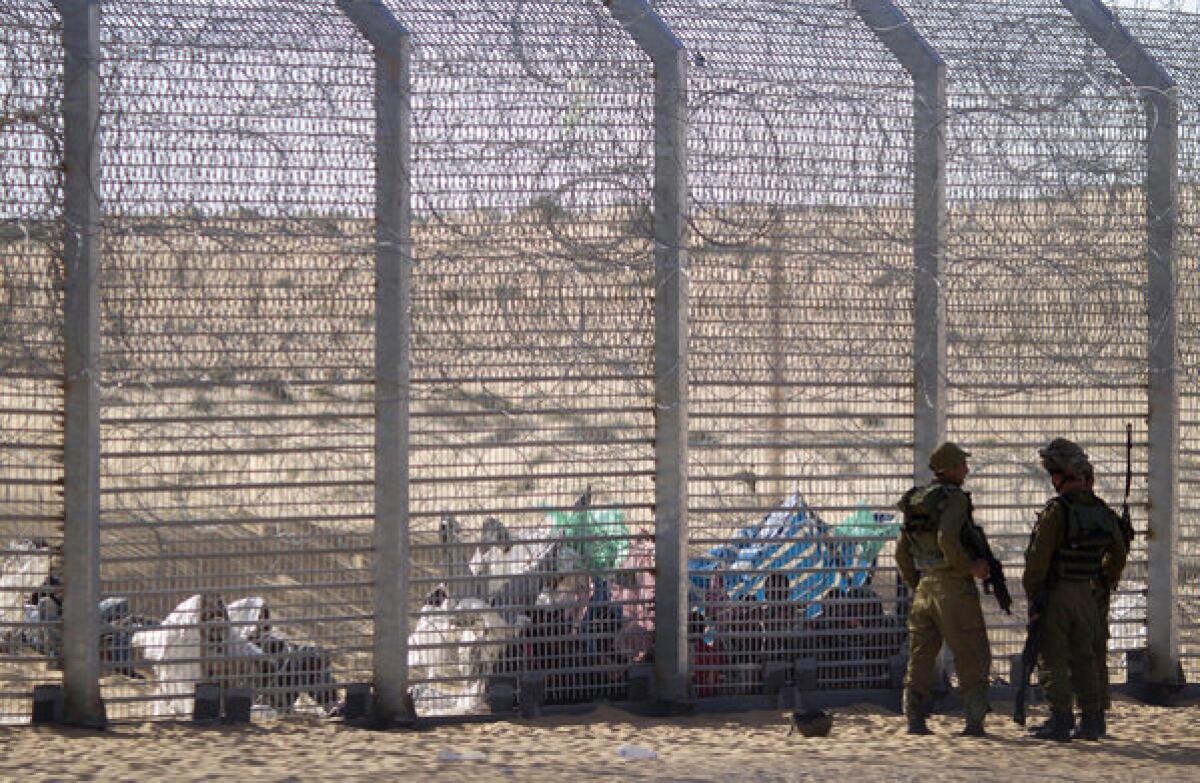Israel completes most of Egypt border fence

JERUSALEM — Two years after construction began, Israel has finished the bulk of the work on a fence along its border with Egypt.
Closing off the rambling, 140-mile-long stretch of desert border will prevent the “unfettered flow of illegal infiltrators, the smuggling of drugs and weapons,” said a statement from the Defense Ministry, which oversaw the $400-million engineering project.
Speaking at a ceremony marking the completion of the main section, Prime Minister Benjamin Netanyahu praised the effort to curb the illegal entry of migrants from Africa, reduced from more than 2,000 a month in January 2012 to fewer than 40 in December.
Stopping the migrants is one aim of the fence, which stands about 15 to 20 feet high and includes multiple layers of barbed wire, communications equipment, a patrol road and asphalt track. It is similar to portions of the barrier that seals off the occupied West Bank from Israel, although that fence includes sections of concrete wall.
Early last year, Netanyahu said Israel would build a similar fence along the desert border with Jordan.
The government says all African migrants entering Israel illegally in recent months have been placed in detention facilities before reaching Israeli cities, where an estimated 60,000 migrants and asylum seekers — widely called “infiltrators” — already live.
“Just as we have stopped infiltration into Israeli cities, so too we shall succeed in the next mission, repatriating the tens of thousands of infiltrators to their countries of origin,” Netanyahu said.
He recently appointed Hagai Hadas, a former Mossad official, to oversee repatriation efforts.
Israel deported nearly 4,000 Africans in 2012, but more sweeping repatriation could be difficult. Many migrants hail from war-torn areas or from countries that have no ties with Israel, according to Sigal Rozen, an official with a local migrant assistance organization.
The influx of African migrants, most of whom slipped across the Egyptian border, has became a divisive social and political issue, as Israelis from already-disadvantaged areas express resentment toward the foreigners and politicians warn of a demographic threat.
The tension has boiled over on several occasions in recent years, with demonstrators calling for the deportation of the Africans and extremists committing hate crimes, including firebombings of migrants’ houses last spring.
In recent days, emotions were running high in the neighborhoods of south Tel Aviv after the arrest of a young man from Eritrea suspected of raping an 83-year-old woman. Several hundred residents rallied against African immigrants, encouraged by conservative political activists.
Police are setting up a new station in the neighborhood, the commander of the Tel Aviv district police said this week. They are also concerned about backlash against the migrants.
“I hope the sane voices prevail and community leaders understand foreigners cannot be attacked,” the commander, Aharon Exol, said in a radio interview.
Israel is holding national elections in three weeks, and two political parties have made the migrant issue a key part of their campaigns. One is Otzma LeYisrael, a new party formed by two ultranationalist lawmakers of the outgoing parliament. The other is Shas, a powerful religious party whose leader, Eli Yishai, has spearheaded many of Israel’s controversial moves, such as deporting Africans as Netanyahu’s interior minister.
In an editorial, the liberal daily Haaretz accused the hard-line leaders of the two parties of “exploiting the shock, anger and fear” residents felt after the rape to win points before the elections.
Sobelman is a news assistant in The Times’ Jerusalem bureau.
More to Read
Sign up for Essential California
The most important California stories and recommendations in your inbox every morning.
You may occasionally receive promotional content from the Los Angeles Times.









